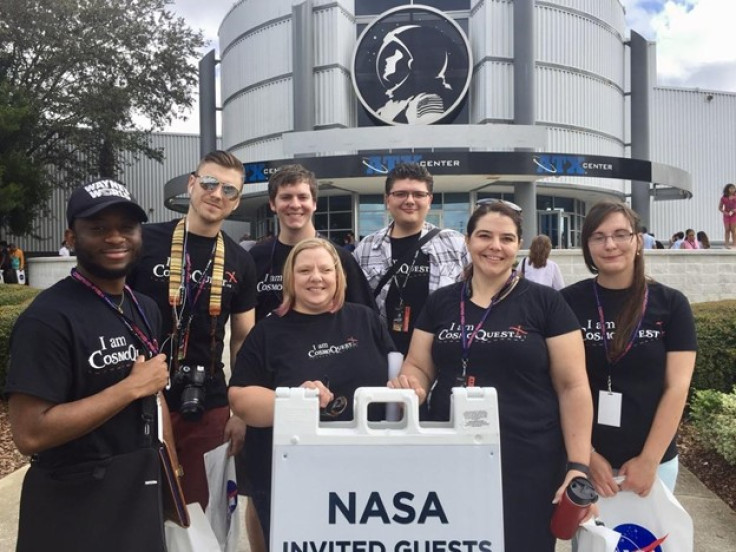
In recent years, the rise of AI in the public consciousness has resulted in fears that AI will eventually replace humans or take over society in a dystopian future. While there are indeed ways where AI can be abused, the nature of AI limits what it can do, making most of these fears unfounded. For the foreseeable future, humans will remain the dominant form of intellect on Earth, with AI merely a tool.
Harnessing the power of human intellect is CosmoQuest, one of the projects under the nonprofit Planetary Science Institute. Founded in 2012 by astronomer, educator, and science podcaster Dr. Pamela L. Gay, CosmoQuest is a community where people can come together and work on space science research, learn astronomy & planetary science, and collaborate with scientists in various meaningful ways that will advance humanity's understanding of the universe. By bringing together the collective intelligence of thousands of people from all over the world, CosmoQuest can do things that a smaller team would take an extremely long time to do while leveraging human ingenuity and insight – something that AI fundamentally lacks.
In 2019, CosmoQuest embarked on its most ambitious project to date – participating in NASA's OSIRIS-REx mission to collect samples from 101955 Bennu, a near-Earth asteroid. Launched in 2016, OSIRIS-REx rendezvoused with Bennu in 2018, taking photos of its surface and transmitting these images to Earth to find a suitable spot to safely collect a sample. Bennu holds a significant amount of information about the birth of the Solar System. A carbonaceous B-type asteroid, Bennu has undergone little geological change since it was formed.
According to Dr. Gay, Bennu is not the first near-Earth asteroid sampled by a spacecraft. That honor belongs to Itokawa, which was visited by the Japanese space probe Hayabusa in 2005. Itokawa had a mix of smooth plains of dust and rocky regions, resulting in a somewhat straightforward mission. Bennu was the opposite – it was nothing but rocks. Dr. Gay describes it as resembling a construction site where an interplanetary dump truck dumped its load of gravel. This made it very challenging to map out and find a safe spot for the craft to land.
This was the CosmoQuest community's time to shine. With almost 4,000 volunteers, CosmoQuest set to work on analyzing thousands of images sent back by OSIRIS-REx. Over 92 days, they marked more than 14 million objects, such as rocks, boulders, and craters. This task was impossible to do utilizing AI, as there was no previous data on Bennu that the AI could use as a training set. This is where humans show their superiority – we can use our judgment and understanding of what a rock is to assess whether the object in the photo is a rock or something else. AI cannot understand something, relying instead on patterns and algorithms.
Dr. Gay shares that the task of mapping out Bennu was incredibly complicated. Many of the volunteers, after doing the tutorial which featured the relatively easy Itokawa, gave up and left once they saw the images on Bennu. However, CosmoQuest found its niche in the video gaming community, where gamers are used to grinding away for in-game riches. CosmoQuest was also coordinating the mission using the Twitch platform, which is popular among gamers. The community engaged in what they called "hate mapping" – being fueled by spite to finish the mission.
In October 2020, OSIRIS-REx tagged Bennu and collected the sample. It arrived on Earth in September 2023, and the sample is now being studied by scientists who seek to learn more about the formation of the solar system.
"A small and wonderful cadre of humans spent their days hating Bennu and rocks," Dr. Gay says. "We were driven by this hate to do the work we needed. Because we just couldn't let Bennu win. For 92 days, we mapped, and we found people who'd grind away with us, clicking on rocks, tracing the length of boulders, and circling craters. Seven of our volunteers marked over one thousand images each. We did science, we hated Bennu, and we found a community. In a way, we made a found family."
CosmoQuest is a tight-knit online community composed of diverse people from all around the world. It provides a safe space for anyone, regardless of race, religion, or sexuality, who is interested in astronomy and planetary science. This provides ethnic minorities, women, and LGBTQ+ people, to participate and become more visible in the scientific community, contributing to making it a more inclusive space.
For most of her career, Dr. Gay has been a strong advocate of citizen science, which increases the visibility and drums up interest in important scientific research among the public, as well as assists the researchers through volunteer efforts. Dr. Gay and the CosmoQuest team host podcasts, produce theEscape Velocity Space News program, live stream important launches and other events, and regularly engage with the community.
In future projects, the CosmoQuest community aims to assist researchers in studying other rocky worlds such as the Moon and Mars. By creating the initial data sets, CosmoQuest will be contributing to the training material for AI, which can assist humanity in mapping the Moon in the same resolution as Google Maps does on Earth.
"CosmoQuest's Bennu project demonstrated the power of collaboration, and it also proves that human intelligence still remains incredibly important in the age of AI," Dr. Gay says. "We are looking forward to the next projects for the CosmoQuest community, where we can all work together, bonded by our common interest in science and understanding the universe. Everyone is welcome to join our community!"







